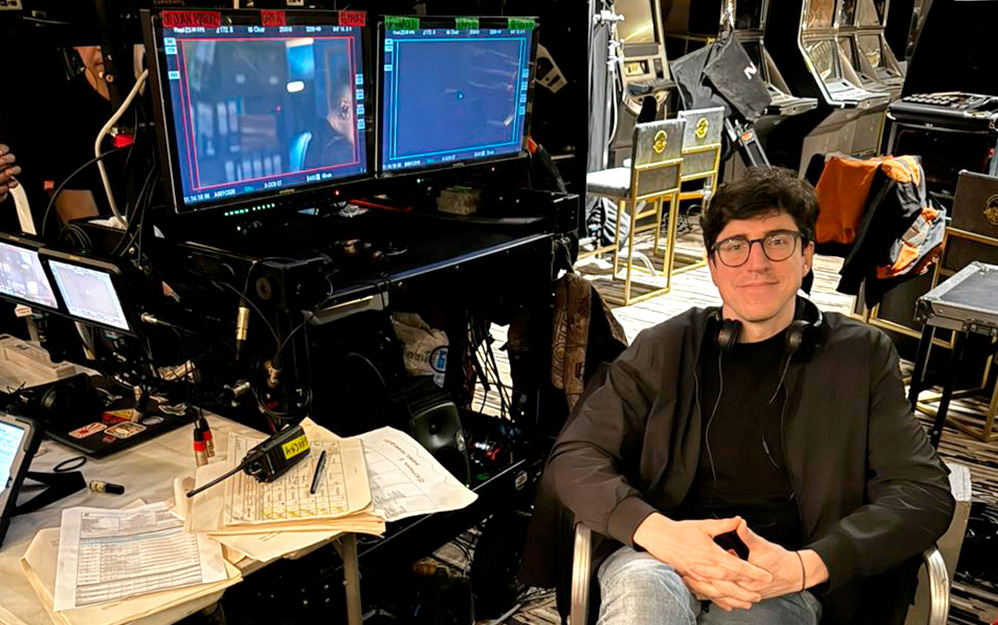U.S. HISPANIC Versión en español
Mexican producers agree to create a Federation to bring together the different associations and unions
Aliana González| 1 de marzo de 2024

Pablo Zimbrón, Carlos Herrera, Inna Payán, Nicolás Celis, Mineko Mori, Daniela Alatorre and Eugenia Montiel. Sitting, Bertha Navarro
Over 70 Mexican audiovisual producers met to evaluate the creation of a federation that represents the union with a single voice, gathering all the existing associations. The initiative is a joint effort of the Mexican Academy of Cinematographic Arts and Sciences, the National Chamber of the Cinematographic Industry, the Mexican Association of Independent Producers, the Association of Producers and Distributors of Mexican Films, and the Union of Producers.
Previously, they presented the conclusions of the workgroups that analyzed the different problems they face during the panel “The future of independent production in the national industry: Towards a Federation that Represents the Union,” composed by Carlos Hernández, Eugenia Montiel, Inna Payán, Nicolás Celis, Mineko Mori, Pablo Zimbrón, moderated by Daniela Alatorre.
As a result of the event, they agreed to bring together two members from each association, adding those independent producers willing to participate and define in a future meeting the objectives and steps to follow for the creation of the Federation. The advantage of a Federation over existing associations is that it will have more representation, therefore power, to dialogue with governments and players such as platforms, to reach agreements on issues such as copyright, the need for regulation, the definition of minimum rates, request for new production funds or to increase existing ones, guarantee labor rights or production incentives, among others.
CINEMATOGRAPHY LAW REFORM
Some of the initiatives on the table include recovering the lost funds, trusts, and seed funds and increasing the money to allocate, for which a comprehensive reform of the Cinematography Law is required as proposed by the workgroup that included the producer Carlos Hernández, founding partner of Mandarina Cine, participated. The group addressed the topic: “Choice between a comprehensive reform of the Federal Cinematography Law or the Restitution of the Development Fund abolished in 2020.
“It is necessary to raise the constitutional rank of culture and cinema as a strategic industry. We also talked about screen time and the logic of monitoring and overseeing it in the regulations, adjusting it from the 10% established by the Law and analyzing how this 10% is allocated,” he said, adding that he also wants to put in place the necessary mechanisms to create new funds, as well as local and state mechanisms to help in the distribution of independent cinema.
GUARANTEE COPYRIGHT
Inna Payán, the founder of Animal de Luz, pointed out that her workgroup talked about film and audiovisual labor rights. “The first question we asked ourselves is whether independent production can generate social security for its workers and what we should do. The first thing is to know the labor legislation, where the labor rights are crystal clear.”
She said that copyrights – already contemplated in the Copyright Law – must be defended. “If we had to do something in this regard, it would be to write something in that Law so that authors do not sign commissioned works so they can collect their royalties. Many times, transnational companies are asking us to sign another type of contract avoiding payment obligation,” she said, adding that it is urgent to review existing laws and ensure everyone complies.
INCENTIVES AND CASH REBATE
Pablo Zimbrón, founder and director of Various Lobos, mentioned the relevance of creating additional incentives or stimuli for existing funds, such as cash rebates, since international competition is increasing.
“The amounts of funds require an update because they have been the same for over 20 years and are not enough,” he said. In addition, the criteria and training of those evaluated for projects that would obtain funds must be guaranteed, as well as the division by gender and ending biases or subjective criteria. “We also evaluated the creation of tabulators for the entire industry. Implement ceilings on our budget amounts, including screenwriters, producers, directors, directors of photography, etc.”
PROMOTE NEW DISTRIBUTION MODELS
Eugenia Montiel, teacher, and independent producer, was a speaker at the panel on the topic of distribution, promotion, and exhibition of cinema that concluded that there is a need to design new distribution models, such as a network of cinematheques and independent theaters, promote more education about cinema in schools, and ensure the placing of trailers and posters of Mexican cinema in commercial theaters.
PLATFORMS FUNDS FOR LOCAL PRODUCTION
Mineko Moni, producer, distributor, and screenwriter, explained that her workgroup was inspired by French Law, which guarantees a percentage of platform funds for local production. “We feel that the Federation is needed to improve the dialogue and negotiation with the platforms.” She added that they should also focus on the defense of intellectual property. “In commissioned work, it is important to find a way to respect the work of the scriptwriters,” as well as to negotiate with public funds to improve the production benefits.
TAKE ADVANTAGE OF UPCOMING ELECTIONS
Nicolás Celis, partner of Pimienta Films, noted the importance of taking advantage of the upcoming elections to advance on these issues. “It is important that IMCINE is part of these conversations,” he said.
TOWARDS A NEW UNION FORMULA
Among the difficulties of unionization is the diversity of producers and conflicts of interest, so putting aside personal agendas to make way for the collective fight is relevant. Celis explained that he participates in unions in the US, which are more organized. “It is hard to reach a consensus in Mexico because we can be very divided. It is important to put these issues aside and think as an industry,” he said.
The renowned producer, Mónica Lozano of Alebrije Producciones, noted that there are successful examples of producer organizations. “Collective visions should prevail over particular ones. We can establish ourselves as a Federation of Producers and have authentic representation before the public and political institutions of the country. We must have a permanent dialogue, reflection, and an understanding of the issues afflicting us,” she said. The producer as the creator of the audiovisual work is one of the topics on the agenda we must promote.
The atmosphere of the event was optimistic, and the process of creating the Federation of Mexican Producers is expected to begin in the upcoming days. The criterion was that the meeting was a very relevant step to push the initiative. The event was closed by Bertha Navarro, a veteran Mexican producer loved by the industry, who said that it was a dream to see the birth of a Federation of Producers in Mexico. Navarro, born in 1943, produced Reed, México Insurgente in 1973, one of the first independent productions in Mexico, recognized in several festivals worldwide. Among her vast career, Bertha has been behind the production of films such as Cabeza de Vaca (1990), Cronos (1993), Así en la Tierra (1995), Un Embrujo (1998), El Espinazo del Diablo (2001), Asesino en Serio (2002), El Laberinto del Fauno (2006), La Delgada Línea Amarilla (2015), Ayotzinapa, El Paso de la Tortuga (2018), and Detrás de la Montaña (2018), among several others.

Carlos Hernández, Nicolás Celis, Inna Payán, Daniela Alatorre, Pablo Zimbrón, Mineko Mori and, Eugenia Montiel
























